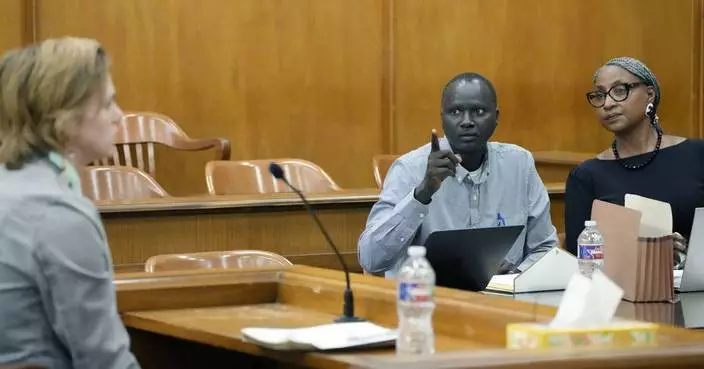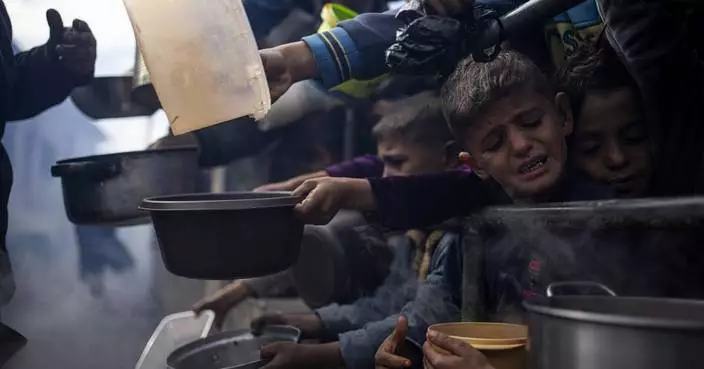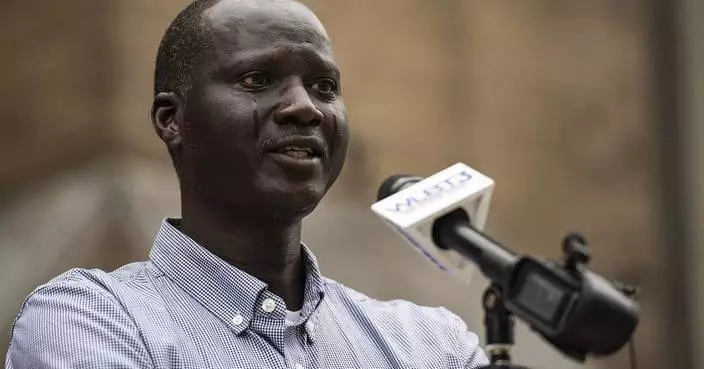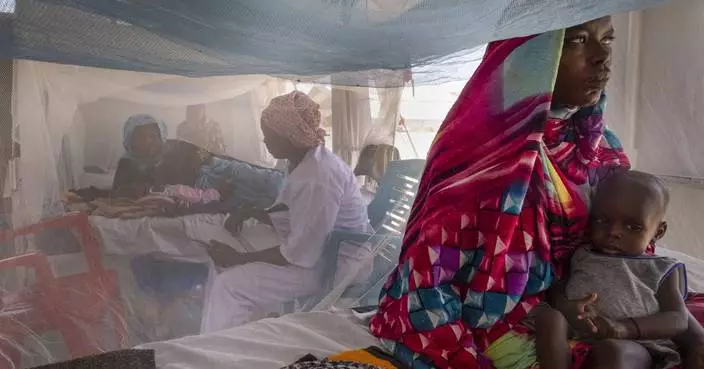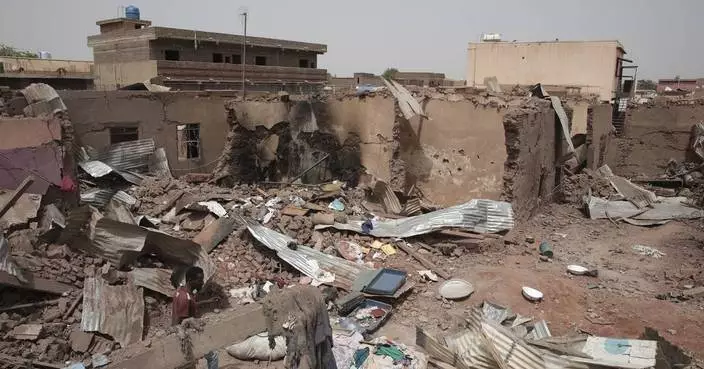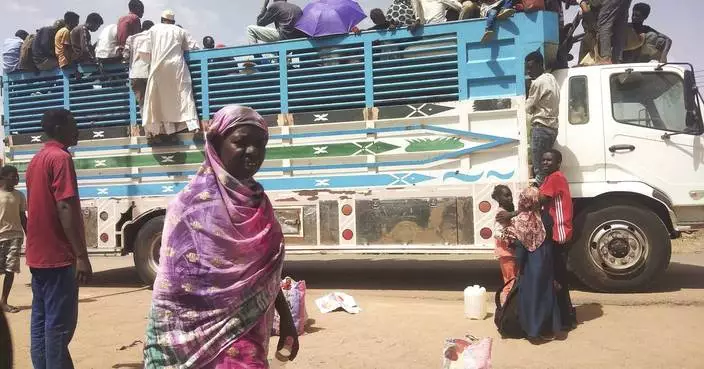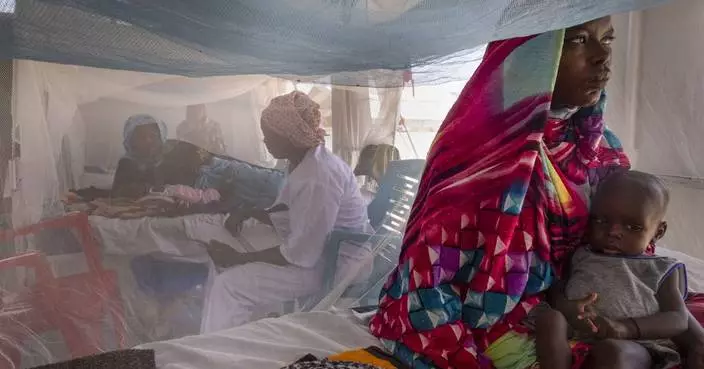Sudan’s Prime Minister Abdalla Hamdok on Monday announced a Cabinet reshuffle to add rebel ministers as part of a peace deal that transitional authorities struck with a rebel alliance last year.
Hamdok announced his new Cabinet, which includes ministers from the Sudan Revolutionary Front, an alliance of armed groups, in a televised news conference in the capital, Khartoum.
The peace deal was signed in October in Juba after months of negotiations and gave rebels Cabinet positions and 75 legislative seats in a transitional parliament.
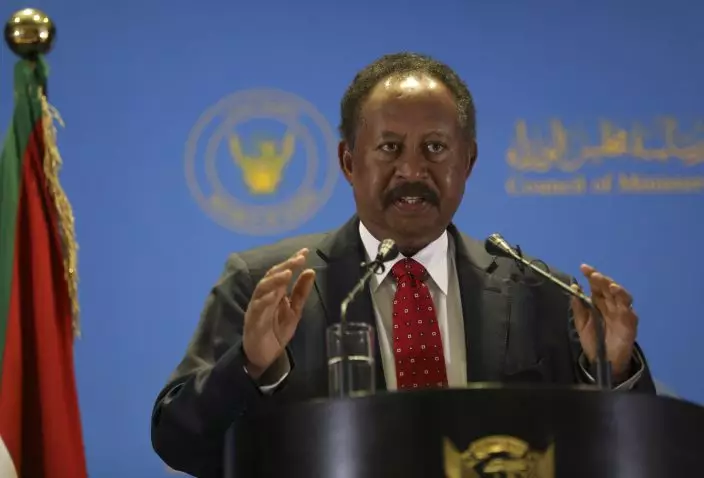
Sudanese Prime Minister Abdalla Hamdok announces new cabinet in Khartoum, Sudan, Monday, Feb. 8, 2021. The new cabinet includes rebel ministers as part of a peace deal transitional authorities stuck with a rebel alliance last year. (AP PhotoMarwan Ali)
Mariam al-Mahdi, deputy chief of the main opposition Umma Party and daughter of Sadiq al-Mahdi, Sudan’s last democratically elected prime minister, was named foreign minister.
Gibril Ibrahim was appointed to lead the Finance Ministry. He is the leader of the Justice and Equality Movement, which is part of the Sudan Revolutionary Front.
The prime minister kept Nasredeen Abdulbari as justice minister and Yasser Abbas as irrigation minister. The military also kept Maj. Gen. Yassin Ibrahim Yassin as defense minister.
Hamdok did not name an education minister to replace outgoing Mohamed el-Tom. He said consultations are ongoing. The new 25-minister Cabinet has four women.
Hamdok dissolved his old Cabinet on Sunday in an expected move that came after Sudan’s ruling Sovereign Council appointed three representatives of the Sudan Revolutionary Front as new members.
Those members are Alhadi Idris Yehia, a leader of the Sudan Liberation Movement; Malik Agar, head of the Sudan People’s Liberation Movement-North faction in the Blue Nile state, and Al-Taher Abu Bakr Hagar, president of Sudan Liberation Forces. The three groups are members of the Sudan Revolutionary Front.
Sudan is on a fragile path to democracy after a popular uprising led the military to overthrow longtime autocrat Omar al-Bashir in April 2019. A transitional military-civilian government is now in power, trying to end decades-long rebellions in various parts of the country.
The three rebel leaders joined the other 11 members of the ruling Sovereign Council, formed in 2019 following a power-sharing agreement between military commanders and civilian protesters who spearheaded the monthslong uprising that led to al-Bashir’s ouster.
Reaching a negotiated settlement with rebels in Sudan’s far-flung provinces was a crucial goal for the transitional government. The deal was hailed as a step toward reviving Sudan’s battered economy and rejoining the international community after years of isolation.
But the government failed to reach similar peace pacts with two other key armed factions, including Sudan’s largest single rebel group, the Sudan Liberation Movement-North led by Abdel-Aziz al-Hilu, and the Sudan Liberation Movement-Army, which is led by Abdel-Wahid Nour.
UNITED NATIONS (AP) — The United Nations food agency warned Sudan’s warring parties Friday that there is a serious risk of widespread starvation and death in Darfur and elsewhere in Sudan if they don’t allow humanitarian aid into the vast western region.
Leni Kinzli, the World Food Program’s regional spokesperson, said at least 1.7 million people in Darfur were experiencing emergency levels of hunger in December, and the number “is expected to be much higher today.”
“Our calls for humanitarian access to conflict hotspots in Sudan have never been more critical,” she told a virtual U.N. press conference from Nairobi.
Sudan plunged into chaos in mid-April 2023, when long-simmering tensions between its military led by Gen. Abdel Fattah Burhan, and the paramilitary Rapid Support Forces commanded by Mohammed Hamdan Dagalo, broke out into street battles in the capital, Khartoum. Fighting has spread to other parts of the country, especially urban areas and the Darfur region.
The paramilitary forces, known as the RSF, have gained control of most of Darfur and are besieging El Fasher, the only capital in Darfur they don’t hold, where some 500,000 civilians had taken refuge.
Kinzli said WFP’s partners on the ground report that the situation in El Fasher is “extremely dire” and it’s difficult for civilians wanting to flee the reported RSF bombings and shelling to leave.
She said the violence in El Fasher and surrounding North Darfur is exacerbating the critical humanitarian needs in the entire Darfur region, where crop production for staple cereals like wheat, sorghum and millet is 78% less than the five-year average.
On top of the impact of escalating violence, Kinzli said, “WFP is concerned that hunger will increase dramatically as the lean season between harvests sets in and people run out of food.” She said a farmer in El Fasher recently told her that her family had already run out of food stocks and is living day-to-day, an indication that the “lean season,” which usually starts in May, started earlier.
Kinzli said she received photos earlier Friday from colleagues on the ground of severely malnourished children in a camp for displaced people in Central Darfur, as well as older people “who have nothing left but skin and bones.”
“Recent reports from our partners indicate that 20 children have died in recent weeks of malnutrition in that IDP camp,” she said.
“People are resorting to consuming grass and peanut shells,” Kinzli said. “And if assistance doesn’t reach them soon, we risk witnessing widespread starvation and death in Darfur and across other conflict-affected areas in Sudan.”
Kinzli called for “a concerted diplomatic effort by the international community to push the warring parties to provide access and safety guarantees” for humanitarian staff and convoys.
“One year of this devastating conflict in Sudan has created an unprecedented hunger catastrophe and threatens to ignite the world's largest hunger crisis,” she warned. “With almost 28 million people facing food insecurity across Sudan, South Sudan and Chad, the conflict is spilling over and exacerbating the challenges that we've already been facing over the last year.”
In March, Sudanese authorities revoked WFP’s permission to deliver aid from neighboring Chad to West Darfur and Central Darfur from the town of Adre, saying that crossing had been used to transfer weapons to the RSF. Kinzli said restrictions from Sudanese authorities in Port Sudan are also preventing WFP from transporting aid via Adre.
Sudanese authorities approved the delivery of aid from the Chadian town of Tina to North Darfur, but Kinzli said WFP can no longer use that route for security reasons because it goes directly into besieged El Fasher.
On Thursday, gunmen in South Darfur killed two drivers for the International Committee of the Red Cross and injured three ICRC staff members. On Friday, U.N. humanitarian chief Martin Griffith called the killing of aid works “unconscionable.”
Kinzli said the fighting “and endless bureaucratic hurdles” have prevented WFP from delivering aid to over 700,000 people in Darfur ahead of the rainy season when many roads become impassable.
“WFP currently has 8,000 tons of food supplies ready to move in Chad, ready to transport, but is unable to do so because of these constraints,” she said.
“WFP urgently requires unrestricted access and security guarantees to deliver assistance,” she said. “And we must be able to use the Adre border crossing, and move assistance across front lines from Port Sudan in the east to Darfur so we can reach people in this desperate region.”

FILE - Sudanese Children suffering from malnutrition are treated at an MSF clinic in Metche Camp, Chad, near the Sudanese border, on April 6, 2024. The United Nations food agency warned Sudan’s warring parties Friday, May 4, that there is a serious risk of widespread starvation and death in Darfur and elsewhere in Sudan if they don’t allow humanitarian aid into the vast western region. (AP Photo/Patricia Simon, File)





